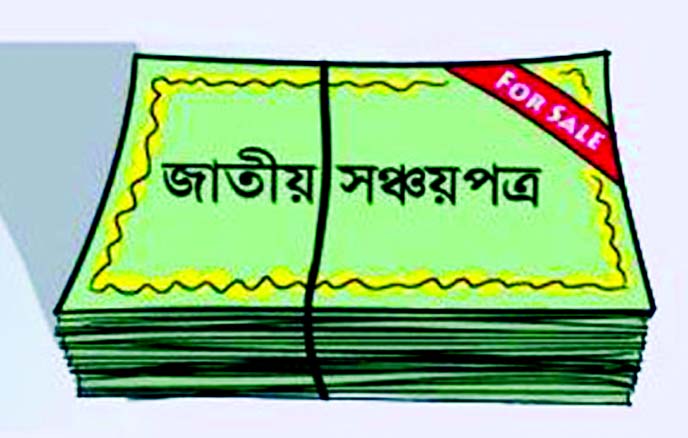
Economic Reporter :
The government borrowed Tk 11,326 crore from the National Savings Certificates (NSC) up to November last year 2015 with a view to meeting the budget deficit.
The government set the borrowing target of Tk 15,000 crore from NSC for the current fiscal 2015-16. So far, the government borrowed above 75 per cent of the target in the first five months (July-November).
In the last fiscal 2014-15, the government had targeted to borrow Tk 9,056 crore from the debt source of NSC, but the actual borrowing stood at Tk 28,773.
The government targeted to bowwow an amount of Tk 38,523 crore from the banking sector during the ongoing fiscal.
The government recently reduced the rate of saving certificates to encourage private investment. During the first five months of the current fiscal, the selling of NSC was Tk 9033.70 crore while it was Tk 9,077.62 crore in the same period of the last fiscal.
Although, the government has reduced the rate of sanchaypatra, it is still high compared with the saving instruments of private commercial banks, experts opined.
Talking to the reporter, Economist M Mamunur Rashid said, investors want security and higher profits against their investment and government savings instruments are offering higher profits.
On the other hand, country’s capital market is failing to return higher profits to investors than the government saving instrument, for which government bonds investment is increasing and getting more popular in recent times, he pointed.
Besides, the banking sector is now enjoying enough liquidity as their loan disbursement in the industrial sector declined significantly in the last few months, he added.
The access liquidity of the banking sector is now over Tk 1,00,000 crore.
“This is an irony that investors are choosing to invest in government bonds”, he said. Actually, the government sells various savings instruments mainly to finance deficit in the national budget.
“The huge rising of sale of national saving certificates and bonds would facilitate the government to meet their budget deficit, simultaneously it will reduce the private sector growth, which is not a good sign for attaining a sustainable economy”, also said the economist.
Commercial bank’s loan disbursement to the industrial sector declined over the last ouple of months due to political unrest of the country and for these reasons some banks have cut interest rates on their savings products.
Investors are reluctant to withdraw their investment from government bonds. “Instead of encashment of the bond after maturity, the general investors are further continuing their investment in national savings bonds”, said Shymal Kumar Shadhu, an Executive of ONE Bank Limited.
The government will reduce the budget deficit by utilizing internal resources including the sale of saving certificates, bank loan and foreign aid, said Sadhu.
The government borrowed Tk 11,326 crore from the National Savings Certificates (NSC) up to November last year 2015 with a view to meeting the budget deficit.
The government set the borrowing target of Tk 15,000 crore from NSC for the current fiscal 2015-16. So far, the government borrowed above 75 per cent of the target in the first five months (July-November).
In the last fiscal 2014-15, the government had targeted to borrow Tk 9,056 crore from the debt source of NSC, but the actual borrowing stood at Tk 28,773.
The government targeted to bowwow an amount of Tk 38,523 crore from the banking sector during the ongoing fiscal.
The government recently reduced the rate of saving certificates to encourage private investment. During the first five months of the current fiscal, the selling of NSC was Tk 9033.70 crore while it was Tk 9,077.62 crore in the same period of the last fiscal.
Although, the government has reduced the rate of sanchaypatra, it is still high compared with the saving instruments of private commercial banks, experts opined.
Talking to the reporter, Economist M Mamunur Rashid said, investors want security and higher profits against their investment and government savings instruments are offering higher profits.
On the other hand, country’s capital market is failing to return higher profits to investors than the government saving instrument, for which government bonds investment is increasing and getting more popular in recent times, he pointed.
Besides, the banking sector is now enjoying enough liquidity as their loan disbursement in the industrial sector declined significantly in the last few months, he added.
The access liquidity of the banking sector is now over Tk 1,00,000 crore.
“This is an irony that investors are choosing to invest in government bonds”, he said. Actually, the government sells various savings instruments mainly to finance deficit in the national budget.
“The huge rising of sale of national saving certificates and bonds would facilitate the government to meet their budget deficit, simultaneously it will reduce the private sector growth, which is not a good sign for attaining a sustainable economy”, also said the economist.
Commercial bank’s loan disbursement to the industrial sector declined over the last ouple of months due to political unrest of the country and for these reasons some banks have cut interest rates on their savings products.
Investors are reluctant to withdraw their investment from government bonds. “Instead of encashment of the bond after maturity, the general investors are further continuing their investment in national savings bonds”, said Shymal Kumar Shadhu, an Executive of ONE Bank Limited.
The government will reduce the budget deficit by utilizing internal resources including the sale of saving certificates, bank loan and foreign aid, said Sadhu.

